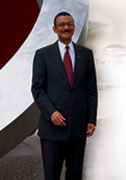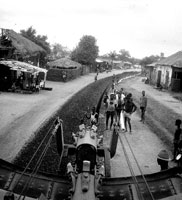 |
| Photo courtesy of Robert Boyd.Boyd-Fitzgerald with help from Steve Teraberry/Stanley Consultants |
Not everyone may be surprised, however, by the engineering firms latest goings-on. The Stanley organization has been doing the nontraditional and unexpected since C. Maxwell Stanley took over the now-91-year-old Muscatine-based firm in the early 1930s. He started an international foray that, to date, has included work in 90 countries on seven continents. Observers note the irony of a company once run by a peace activist that had 70 volunteers to fill nine initial slots for work in war-torn Iraq.
Muscatine is not where you would expect to find a firm with overseas aspirations and a non-white in charge. The town of 22,600, which once made buttons from river clamshells, is vintage heartland USA. As of the 2000 census, its population was 1% black. Downtown storefronts each display American flags; the local hardware store opens at 6:30 AM and stocks pre-tied yellow ribbons; and the movie theater will not show Michael Moores anti-Bush Administration documentary Fahrenheit 9/11.
|
Max Stanley resisted moving company headquarters to larger or more prestigious locales. Disciples of his "vision" say that decision is now key to Stanleys success as a global competitor and an appealing employer. Thomopulos says the firms diverse international projects and its devotion to staff keep locals engaged. "I never guessed I would have stayed here so long," says Gayle McCauley, a 23-year upwardly mobile veteran who now is senior vice president in charge of Stanleys education, healthcare and industrial group. "Were not a hire-and-fire consulting firm."
Stanley aims for $100 million in global and domestic annual revenue by next year and double that by 2013 or sooner, executives say. The private firms stock now is so coveted that managers and employeesthere is no distinction as stockholdersseek twice the shares they want just to get half as many.
"Employees are called members so people dont feel they are pawns of management. People feel theyre part of the action," says Maxs son Dick, who spends half his time as firm chairman and half running his fathers unrelated foundation that promotes world peace and global survival. It has an $85-million endowment and a $4.5-million annual budget.
Thomopulos, a nearly 40-year Stanley veteran in charge since 1987, is only the fourth president and CEO since the design firms birth in 1913. While not yet equalling Max Stanleys stature in international circles, Thomopulos is emerging as the companys chief salesman and a force in global engineering politics on behalf of fairer global market access for U.S. firms.
 |
| Visionary. Company ancestor Max Stanleys wanderlust and foresight first took it overseas. |
The company and its current chief share international roots in Africa. Ever client-focused, Stanley went to Liberia in 1956 to build a diesel powerplant for Republic Steel Co. "The international division was [Max} Stanleys pet," says a biography written six years after his 1984 death. But a seemingly-prestigious commission to design Liberias executive mansion was a financial boondoggle that strained Stanley family relations, says the bio.
Even so, the rift did not stop the firms niche in building infrastructure for other poor and newly independent nations in Africa, and elsewhere. "Were cautious enough now to make sure the money is in place," says Jim Hollatz, senior vice president and international unit chief.
Thomopulos now is the proponent of Stanleys global strategy and he also understands the risk. The Nigeria-born executive is the son of a Greek trader and a local woman who grew up Christian in a Muslim country. He came to the U.S. in 1962 on a State Dept. scholarship and earned a civil engineering degree in Kansas. Thomopulos took a summer job with Stanley and ended up running its Liberian operations. He also managed the firms entire international unit for almost a decade.
 |  |
| THEN AND NOW Work in 1950s Liberia (left) started Stanley overseas. Phoenix job (right) is more recent. (Photos above and top right courtesy of Stanley Consultants) | |
The decision to stay with Stanley was not easy for a black man in 1960s America. Thomopulos could not find housing for his family. "The company ended up buying us a trailer and putting it on a piece of land that the principals owned," he says. "I stayed because I believed in the firms values." Thomopulos ended up living in more cosmopolitan Iowa City, home of the University of Iowa. Stanley also hired a management consultant to weigh possible impact of Thomopulos later elevation to CEO.
Today Thomopulos is the firms best marketing tool, much in demand by its professionals to meet clients and sell the companys talents. He also orients new employees on company values over pizza lunches and flew to Iraq to spend Christmas with his in-country expatriates. "My life would be very difficult in the international unit without someone likes Gregs," says Hollatz. "He is the right president for us now."
Stanley is well connected to U.S. and international funding agencies and development banks and has been a long-time engineer to the American military overseas, particularly in the Middle East. A track record with the Army Corps of Engineers...
black CEO running a large U.S. design firm today still is somewhat uncommon. But picture a black CEO running a large and growing international engineering company from a small industrial city on the Iowa side of the Mississippi River. Stanley Consultants Inc., under Gregs G. Thomopulos, continues to confound.
Post a comment to this article
Report Abusive Comment